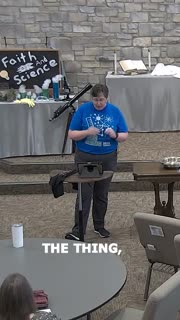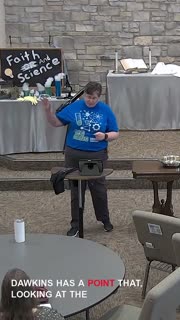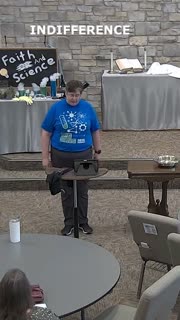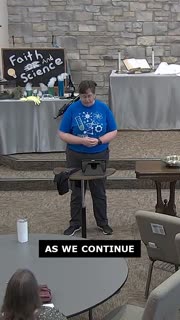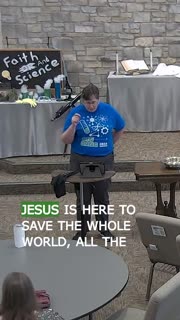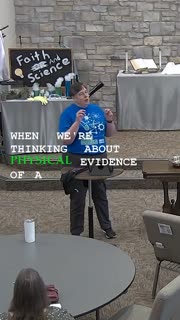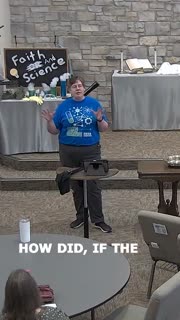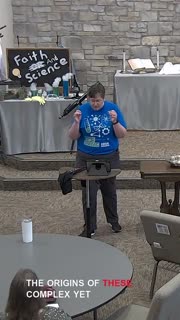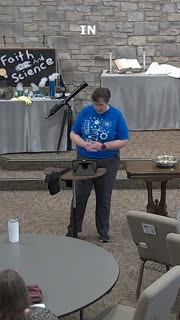Evidence of God's Love in Creation and Morality
Devotional
Sermon Summary
Bible Study Guide
Sermon Clips
### Quotes for Outreach
1. "The thing, though, is that a water whirlpool, just like a tornado whirlpool, reminds us that we are not in control. We don't have power. There are forces in the universe that are greater than us. And for some of us, that makes us ask questions. Did God create the universe? Is there physical evidence for God? Is there evidence in the universe that God is good? Or is the universe just out to get us?" [21:19] (33 seconds)
2. "Maybe Dawkins has a point that, looking at the base reality of tornadoes, there is pitiless indifference in the universe. But maybe he loses a point that the humans, who are part of God's creation, show care for each other, even when there is no logical reason to do so. Maybe he loses a point. Maybe there is goodness in the universe." [26:42] (24 seconds)
3. "John 3.16 reminds us that God is good and God is still engaged and God has sent Jesus to be with us to save us and to save all of creation. Because at the end of the day if we go back to the logical arguments the debate with atheists if there's just one person who cares for another person the atheists lose their argument that the universe is only pitiless indifference because logically none of us should care for anyone else we should all just be out for ourselves and that's not the reality we have." [37:21] (60 seconds)
4. "As we continue to grow with Jesus we get to teach others to care and love with grace and this is where we can stand on the evidence the physical evidence for the existence of God the constants of the universe point to God the goodness of humans caring points to God quote Dr. Gart gives it a try and I think this is beautiful the universe that we observe has precisely the properties we should expect if there is at bottom a grand design a purpose good and evil the existence of beings who can worship their creator and all that is needed to justify belief in the presence of God." [38:24] (50 seconds)
### Quotes for Members
1. "Jesus is here to save the whole world, all the whoevers. He is not here to judge us. Jesus is here. He is here to save the world, to save the universe. Now, it seems to me like we have an epidemic of judging going on here on the planet at the moment. And I'm not just talking about the Olympic judges. We are really into judging each other right now." [24:07] (31 seconds)
2. "When we're thinking about physical evidence of a God who knows goodness, I think when we look at our children, we see physical evidence. They are innately hardwired to know right from wrong. This does not sound like evolutionary biology to me. I don't think the random movings of the universe would suddenly create the idea of right and wrong. To me, this sounds more like a, I'm going to eat an apple from this tree of the knowledge of good and evil that God told me not to eat for a moment." [28:49] (39 seconds)
3. "How did, if the universe has no creator and it is void of good and evil and it is just blindly doing whatever it does, how did it come up with constants that are constant, that are reliable, that are always the same? Constants that seem to hold the universe together. I think these constants are another piece of physical evidence that there is a creator who had a plan for the universe, who came up with things that would hold the universe together, that would give us life and give us a place to exist. Without these constants we don't have life." [32:28] (43 seconds)
4. "The origins of these complex yet fundamental biochemical systems remains a mystery. Progress has been slow to non-existence. If the universe just came into being there shouldn't be a block there shouldn't be a barrier we should be able to figure out do all the experiments and research and figure it all out and we just can't which is more physical evidence that there is nothing back there but God. God is the mystery God is the power that put all of this into a plan." [36:16] (42 seconds)
5. "In Genesis and throughout the Bible we see a God that gives us a moral compass God gave us a book that is the story of truth the story of right and wrong of love and compassion and grace and justice. We can live with John chapter 3 strong in the assurance that Jesus is here for us and for all of creation." [36:47] (27 seconds)
Ask a question about this sermon
1. "The thing, though, is that a water whirlpool, just like a tornado whirlpool, reminds us that we are not in control. We don't have power. There are forces in the universe that are greater than us. And for some of us, that makes us ask questions. Did God create the universe? Is there physical evidence for God? Is there evidence in the universe that God is good? Or is the universe just out to get us?" [21:19] (33 seconds)
2. "Maybe Dawkins has a point that, looking at the base reality of tornadoes, there is pitiless indifference in the universe. But maybe he loses a point that the humans, who are part of God's creation, show care for each other, even when there is no logical reason to do so. Maybe he loses a point. Maybe there is goodness in the universe." [26:42] (24 seconds)
3. "John 3.16 reminds us that God is good and God is still engaged and God has sent Jesus to be with us to save us and to save all of creation. Because at the end of the day if we go back to the logical arguments the debate with atheists if there's just one person who cares for another person the atheists lose their argument that the universe is only pitiless indifference because logically none of us should care for anyone else we should all just be out for ourselves and that's not the reality we have." [37:21] (60 seconds)
4. "As we continue to grow with Jesus we get to teach others to care and love with grace and this is where we can stand on the evidence the physical evidence for the existence of God the constants of the universe point to God the goodness of humans caring points to God quote Dr. Gart gives it a try and I think this is beautiful the universe that we observe has precisely the properties we should expect if there is at bottom a grand design a purpose good and evil the existence of beings who can worship their creator and all that is needed to justify belief in the presence of God." [38:24] (50 seconds)
### Quotes for Members
1. "Jesus is here to save the whole world, all the whoevers. He is not here to judge us. Jesus is here. He is here to save the world, to save the universe. Now, it seems to me like we have an epidemic of judging going on here on the planet at the moment. And I'm not just talking about the Olympic judges. We are really into judging each other right now." [24:07] (31 seconds)
2. "When we're thinking about physical evidence of a God who knows goodness, I think when we look at our children, we see physical evidence. They are innately hardwired to know right from wrong. This does not sound like evolutionary biology to me. I don't think the random movings of the universe would suddenly create the idea of right and wrong. To me, this sounds more like a, I'm going to eat an apple from this tree of the knowledge of good and evil that God told me not to eat for a moment." [28:49] (39 seconds)
3. "How did, if the universe has no creator and it is void of good and evil and it is just blindly doing whatever it does, how did it come up with constants that are constant, that are reliable, that are always the same? Constants that seem to hold the universe together. I think these constants are another piece of physical evidence that there is a creator who had a plan for the universe, who came up with things that would hold the universe together, that would give us life and give us a place to exist. Without these constants we don't have life." [32:28] (43 seconds)
4. "The origins of these complex yet fundamental biochemical systems remains a mystery. Progress has been slow to non-existence. If the universe just came into being there shouldn't be a block there shouldn't be a barrier we should be able to figure out do all the experiments and research and figure it all out and we just can't which is more physical evidence that there is nothing back there but God. God is the mystery God is the power that put all of this into a plan." [36:16] (42 seconds)
5. "In Genesis and throughout the Bible we see a God that gives us a moral compass God gave us a book that is the story of truth the story of right and wrong of love and compassion and grace and justice. We can live with John chapter 3 strong in the assurance that Jesus is here for us and for all of creation." [36:47] (27 seconds)
